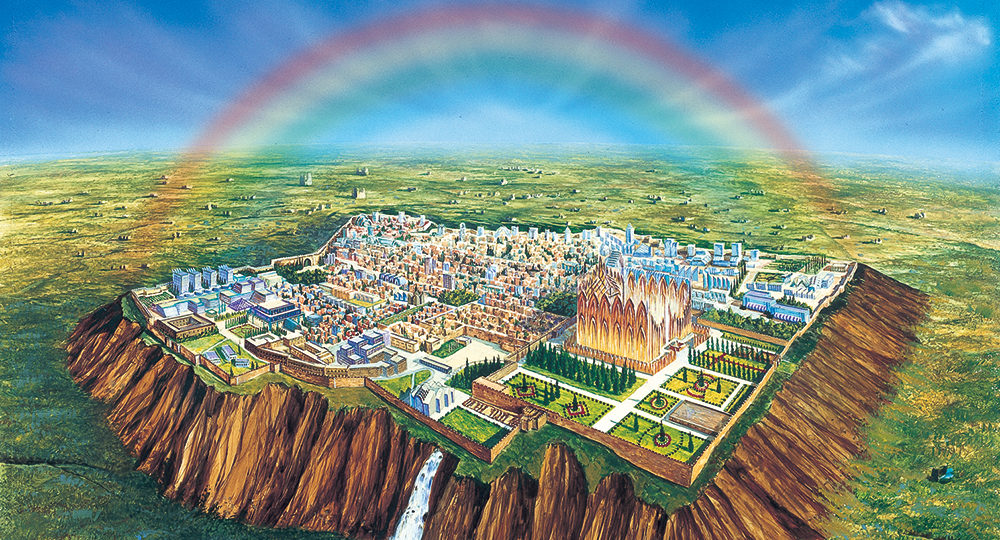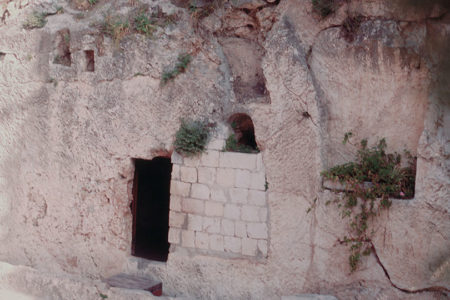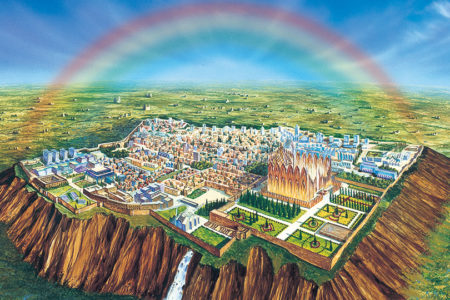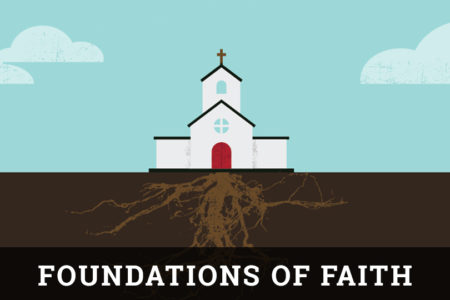The Servant’s Reign
The Servant of the Lord is a major theme in the Book of Isaiah. An understanding of this term is germane in grasping the meaning of God’s redemptive program for Israel. The book identifies men such as Isaiah himself, Eliakim, and David as servants, but they are not qualified to perform the Servant’s redemptive work. The nation of Israel is also identified as “the Lᴏʀᴅ’s servant” (42:19; cp. 41:8–9; 43:10; 44:1), but it too is unqualified to perform the Servant’s redemptive work. Israel, as a servant, is “blind” and “deaf” (42:19) because it sinned against God, being deaf to His voice and blind to its spiritual call.
To accomplish God’s redemptive work, the Servant of the Lord must possess divine qualities. An in-depth study of Isaiah’s Servant Songs (42:1–4; 49:1–6; 50:4–9; 52:13–53:12) clearly indicates that only the Lord Jesus Christ possesses such divine qualities. Matthew 12:17–21 confirms that Jesus fulfills the description of the Servant of the Lord given in Isaiah 42:1–4. This article presents the Servant’s redemptive ministry and Kingdom rule, as taught in Isaiah.
Redeeming Savior
Isaiah’s name means Salvation of the Lord, which is the theme of the book he authored. Salvation is accomplished through the Servant of the Lord, who paid the price of redemption by His sacrificial death. God said that He would give the Servant of the Lord “for a covenant of the people” (42:6). He is a covenant in that He personifies and mediates the blessing of salvation to Israel in the Abrahamic, Davidic, Palestinian, and New Covenants. He is the God-man, empowered by the Holy Spirit, having a quiet and submissive demeanor, and His ministry comforts and encourages the weak.
The Servant of the Lord was rejected during His earthly ministry, was the object of reproach, and suffered personally as a condemned criminal. He gave His life vicariously for others, and in so doing, God made His soul an offering for sin. His sacrificial death and shed blood provide the means by which many nations may be sprinkled (52:15) or cleansed from sin. After His death, He was given an honorable burial with the rich. Having accomplished the means of salvation for the world, He was resurrected to glory.
Reconciling Servant
The Servant of the Lord, through his sacrificial death, has enabled mankind to have a changed relationship with God. God, through His divine love and mercy, took the initiative to reconcile mankind from a state of enmity with Himself to a state of fellowship. Today, individual Jews and Gentiles who receive Christ as their Savior can be reconciled to God. But Israel as a nation will not experience reconciliation and final restoration until the Servant’s Second Coming. At that time, God, who is the “father” (63:16) and “husband” (54:5) of Israel, will redeem the nation from captivity and judge all its persecutors.
But before that day, Israel must face the Great Tribulation, the horrible furnace of affliction, which only a remnant will survive. After the Tribulation, Israel as a nation will be saved, cleansed from its sin, filled with the Holy Spirit, and “called holy” (4:3–4). In that day, Israel will be secure and exalted above all nations (49:22–23; 60:16). It will praise the Lord in song for the great salvation and reconciliation that God will bring about on its behalf (12:1–6; cp. 26–27).
Ruling Sovereign
After the Servant of the Lord returns to the earth, He will set up a thousand-year theocracy called the Millennial Kingdom. It will be established on Christ, who is characterized as “a foundation…stone…a precious cornerstone, a sure foundation” (28:16). His sovereign rule will be characterized by justice, righteousness, faithfulness, holiness, and glory, as He rules from “the throne of David” (9:7). At that time, He will be identified by a number of names, such as “the branch” (4:2), “the Lᴏʀᴅ of hosts” (24:23), “the king” (33:17), “judge” and “lawgiver” (33:22), “shepherd” (40:10–11), “God” (52:7), and “the Redeemer” (59:20).
Isaiah described what the world will be like during the Servant’s reign. There will be international peace because He, “The Prince of Peace” (9:6), will be ruling. His personal presence will guarantee Israel’s peace, violence will be put away from the nation, and its warfare will end. Nations “shall beat their swords into plowshares, and their spears into pruning hooks”; they “shall not lift up sword against” each other, “neither shall they learn war any more” (2:4).
The topography of Israel and the world will be dramatically altered when the Messiah returns. When His feet touch the Mount of Olives, it will split down the middle, producing changes in Israel and the world. The ground around Jerusalem will be flattened, but the city will not be affected by the earthquake. Jerusalem will remain elevated in all its pristine beauty. A river will flow out of the city into the Negev, causing the Judean desert to “blossom like the rose” (35:1) and the Dead Sea to be “healed” (Ezek. 47:8). The area will become like the garden of Eden.
There will be psychological changes for people living in the Millennial Kingdom. “The voice of weeping shall be no more heard” in Jerusalem (65:19) or in the world. In that day the Lord will wipe away the tears of His people, and they will rejoice with gladness as songs fill their hearts.
The people living in the Kingdom will be physically changed. They will be healed from sickness, deformities, and feeblemindedness. Four groups of people will enter the Millennium. Three groups—Old Testament believers, the church, and Tribulation believers who were martyred for their faith—will enter the Kingdom in their glorified bodies. The fourth group—believers who will survive the Tribulation in their natural bodies—will procreate and repopulate the earth. Those living in the Millennium will experience longevity. “There shall be no more in it an infant of days, nor an old man that hath not filled his days” (65:20). Children born in the Millennium will not suffer “trouble” (65:23) or death at birth, causing the world population to soar. If one dies at a “hundred years old,” he or she will be considered a child, but those experiencing untimely deaths will be considered sinners judged by God, for “the sinner, being an hundred years old, shall be accursed.” (65:20).
Two questions are often asked about this period. First, if only righteous people will enter the Millennial Kingdom, how will there be sin? We must remember that those born in the Millennium will still possess a depraved Adamic nature and will be required to accept the Messiah as their Savior. Many will receive Him and obey His rule, but others will not. The unsaved who rebel against the Lord’s rule will suffer severe judgment. The second question is, how will there be peace on earth with sinners being born into the Millennial Kingdom? The answer is simple: Christ will be ruling the earth with a rod of iron, Satan will be bound in the bottomless pit, and any manifestation of sin will be put down quickly.
Material prosperity will abound during the Millennium. A perfect economy will bring social and industrial wealth to Israel. Agricultural productivity will be abundant, as people plant vineyards and partake of the bounty. They will build houses and not fear repossession or confiscation by an invading enemy. Israel will be guaranteed the Lord’s protection and will enjoy all the blessings of material prosperity that were promised to it. They will enjoy long and fruitful lives during the Kingdom age.
There will be zoological changes also. As God’s curse of mankind’s sin is lifted from creation, all enmity between mankind and the animal world will vanish. Animals will no longer be predators. They will lie down together, children will lead them, and nursing babies will crawl around on the dens of poisonous snakes without fear of injury. Yet the serpent will remain a degraded creature, under a curse, crawling in the dust of the earth for its food (65:25; cp. Gen. 3:14).
Jerusalem will be the center of worship. The Servant of the Lord will be enthroned there in all of His kingly glory. Spiritual knowledge will flood the earth as the Lord instructs Israel in His ways. All nations will be required to come to Jerusalem and learn from the Jewish people, who are called “the Priests of the Lord” and “the Ministers of our God” (61:6). Those who come to worship will be filled with the Holy Spirit. God will anticipate their prayer needs and will answer before or while they speak. A Millennial Temple will be built, and the sacrificial system will be reinstituted, as Israel leads the world in worship.
The question is often raised, if Jesus’ sacrificial death was the only efficacious, once-for-all sacrifice to expiate sin, why will animal sacrifices be reintroduced in the Millennial Temple? Sacrifices in the Millennial Temple will not expiate sin, just as the Mosaic offerings could not. Many conservative scholars conclude that these offerings will be memorial in nature, similar to the church’s keeping the Lord’s Supper in remembrance of Christ’s death. The offerings will be visible reminders of Christ’s efficacious work on the cross. These sacrifices will perform an added function—“to make reconciliation [atonement] for the house of Israel” (Ezek. 45:17; cp. vv. 15, 20). This will not be a return to the Old Testament Mosaic Covenant or law, but a new system set up with dispensational distinctions applicable to the Millennial Kingdom.
The word atonement means covering. Under the Mosaic system, the person offering an animal sacrifice was simply covering his sin by means of a blood atonement, averting God’s divine anger and punishment. It was Christ’s death on the cross, not the Levitical sacrifice, that made it possible for a person’s sin to be taken away. In like manner, the sacrifices offered during the Millennium will remove ceremonial uncleanness and prevent defilement from polluting the Temple. This will be necessary because God’s presence will be in the midst of sinful people. This act of purification will propitiate God, making it possible for Him to dwell among His people. The future animal sacrifices will not relate to matters of eternal salvation but will provide finite cleansing of impurities from those living in the Millennial Kingdom in their natural bodies. These sacrifices will not diminish Christ’s worth, nor should they be spiritualized, but taken literally (Jerry M. Hullinger, “The Problem of Animal Sacrifices in Ezekiel 40–48, ” Bibliotheca Sacra, vol. 152, issue 607, pp. 2–6).
The Servant Songs of Isaiah may be summed up in God’s declaration, “I will place salvation in Zion for Israel, my glory” (46:13). When the Servant of the Lord stepped across the galaxies of heaven to the planet Earth, He became a suffering Servant to provide salvation for the world. At the appointed time of God’s choosing, He will return to the earth to establish salvation in Israel and set up His regal, righteous rule on Mount Zion.
Interestingly, when The Friends of Israel gave birth to this publication 55 years ago, its name, Israel My Glory, was taken from Isaiah 46:13.







